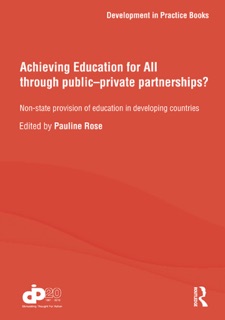Concern for achieving Millennium Development Goals (MDGs) by 2015 has led to a focus on the role that non-state providers (NSPs) can offer in extending access and improving quality of basic services. While NSPs can help to fill a gap in provision to those excluded from state provision, recent growth in both for-profit and not-for-profit providers in developing countries has sometimes resulted in fragmentation of service delivery. To address this, attention is increasingly given in the education sector to developing ‘partnerships’ between governments and NSPs. Partnerships are further driven by the expectation that the state has the moral, social, and legal responsibility for overall education service delivery and so should play a role in facilitating and regulating NSPs.
Even where the ultimate aim of both non-state providers and the state is to provide education of acceptable quality to all children, this book provides evidence from diverse contexts across Africa, South Asia, and Latin America to highlight the challenges in them partnering to achieve this.
This book was published as a special issue of Development in Practice.



